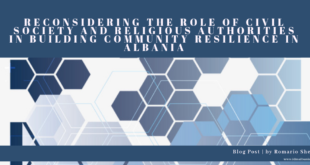Author: Romario Shehu
24 December 2018 – The proliferation of terrorist groups has turned violent extremism (VE) into a crucial concern in international politics. In facing this problem, states have advanced their national capacities and international actors have contributed to states’ efforts by financing state and non-state actors working in the process of countering VE.
Similar to its neighbouring Western Balkan (WB) states, Albania has not been immune to the challenges of religious violent extremism. The country experienced the foreign fighter (FF) phenomenon for the first time between 2011 and 2014 with up to 150 Albanian citizens travelling to Syria and Iraq.[i] Following these events, the Albanian government took action to counter the threat and deter individuals that take part in, or recruit fighters for, foreign conflicts. In co-ordination with various international actors the government started establishing a whole-of-society approach through a strategy of Countering Violent-Extremism (CVE). This, comprehensive response seeks to mobilize and empower local governments, religious communities, and civil society actors with the aim of promoting civic values and respect for human rights.
The encompassing response toward the VE threat by state and non-state actors has had a substantial impact on limiting the recruitment process and rising public awareness. Yet, there are improvements to be made in the current modus operandi of P/CVE actions in Albania in order to avoid certain pitfalls. The role of civil society and that of religious communities are of particular importance, thus, looking at their role from a holistic approach would help address violent extremism in a structural manner.
The role of CSOs in P/CVE efforts in Albania
Civil Society is understood as a diverse body of civil actors, communities, and formal or informal associations that has a wide range of roles: it engages in public life and seeks to advance shared values and objectives.[ii] Civil society is essential in P/CVE programs and initiatives due to their expertise and contribution in working with and within local communities. Moreover, it is also necessary because the government has focused so much on the central level, and more concrete PVE actions are yet to take place at the local level.[iii]
Over the past five years there have been a growing number of funds available for Albanian CSO’s to run projects with the aim of preventing and countering VE. The abundance of calls for P/CVE initiatives attracted the attention of many CSOs in the country that despite having no prior experience started implementing these initiatives. Eventually, P/CVE activities became a new focus area in the country, yet, the lack of expertise and coordination has limited their effectiveness.
The work that has been done in the sector by civil society is undeniably important, but so is its need for improvement. Most importantly, civil society practitioners should build their own capacities and delve deeper into understanding the various ideological, socio-economic and structural drivers of VE prior to implementing P/CVE initiatives. Only then they can move on to addressing these drivers by strengthening the actors and factors that are conducive to resilience.
So far, their focus has been on countering VE, with initiatives focussing on preventing VE still at the very beginning. Other pressing issues, such as concrete programs dealing with de-radicalisation of those whose actions and rhetoric is considered radical[iv], are not yet in place. Furthermore, the weak coordination between civil society actors, and the limited target groups (mainly youth) and focus areas (mainly awareness-raising) make P/CVE initiatives less effective. De-radicalisation programmes should target radicalized individuals to prevent them from feeling alienated from society, whether they are detained, awaiting prosecution, or have not been involved in criminal activity. They should be given another opportunity to transition from actors conducive to vulnerability to actors conducive to resilience. Only then, the community’s resilience can be strengthened.
Making P/CVE programmes more effective
P/CVE programmes, more than being implemented as a stand-alone pillar, should be incorporated into state-building reforms and properly implement a whole-of-society approach. Because violent extremist groups often create a following based on grievances with societal issues, or step in a vacuum created by ineffective governance, successful establishment of sustainable democratic institutions often goes hand in hand with CVE. In this regard, Gjergji Vurmo[v] argues that P/CVE measures at local level should be streamlined in the context of already existing models such as ‘school as community centre” and community policing programs, both of which centre on involving municipalities, communities, schools, civil society, media, religious groups, and community leaders.[vi] Rachel Briggs argues that organizations may not even work under the pretext of CVE or PVE directly, but indirectly do so through programs that aim to alleviate poverty and develop infrastructure and democratic institutions[vii].
Hitherto, CSOs’ work has mainly focused on raising awareness and targeting youth, at a time when they have major potential to contribute to the topic. Furthermore, CSO’s role can have tangible results if they widen their operations by having a more holistic approach. First, help building the capacities of all first line responders (such as teachers, police officers, social workers, religious leaders, youth workers). Second, target various groups (youth, women, radicalized people, unemployed, uneducated, different geographical locations). And third, work in different focus areas tailored to the local needs (community engagement, empowerment, strengthening civic values, awareness-raising, capacity-building, employment and de-radicalization/disengagement programmes). Moreover, the initiatives implemented by CSOs should not overlap, but rather be part of the wider state-building process. It should be a nationally coordinated strategy in which each contributing actor plays its part in building the synergy. Their aim should be to coordinate their efforts rather than engage in individual initiatives that only last for a few months and eventually fades away.
The role of religious authorities in P/CVE efforts in Albania
Religious authorities have played an important role in developing and implementing P/CVE actions in Albania. Unique to religious authorities, is their theological power and their role in building a counter-narrative to VE propaganda. Counter-narratives are especially important for the returnees – individuals who have returned home after staying in conflict zones in Syria/Iraq – and for the early phase religious believers. As the first steps into religion are considered very delicate especially for younger individuals, research suggest that it is extremely important that such process takes place in officially recognised institutions and under the mentorship of theologically prepared religious clerics[viii]. In addition, the counter-narratives are also important for the youth, as the data suggest that the most susceptible age group to recruitment for violent jihad among ethnic Albanians is 21–25 years old.[ix] Youth of vulnerable communities are especially in need for P/CVE programmes because activism in a radical milieu could provide restless youth with excitement or sense of purpose, or it could provide those feeling marginalized and excluded personal empowerment and status.[x]
Although the importance of religious authorities in P/CVE programmes is broadly agreed, the official religious institutions like the Muslim Community of Albania (MCA) tend to be viewed as the only reliable religious actors engaging in P/CVE programmes in Albania. Even though theoretically P/CVE actors in Albania have all embraced a whole-of-society approach, practically they have created two groups; the neglected – all non-official groups within Islam, and the over-consumed – typically the representative from the MCA. Even though the MCA is the only official institution representing Muslims within the country, due to various political and/or theological reasons, other legitimate groups of Islamic thought have established a strong presence and continue to grow in Albania.
Broadening the scope of religious authorities
There is a need to deconstruct the idea of associating reliability and credibility only with the MCA and excluding other groups. This is especially important, because religious freedom is embedded in the constitution of Albania and an important pillar in Albanian society. According to the Constitution of the Republic of Albania, “freedom of conscience and of religion is guaranteed”, so people are free to follow whichever religious practice they like. The constitution also protects people from being forced or encouraged to be part of any particular denomination, even when that denomination is an officially recognized religious institutions. On that account, it might be more efficient for P/CVE stakeholders to avoid a “MCA monopoly” on the fight against VE, and try to include other Muslim groups. In this way, PVE efforts gain additional perspectives, reach a wider community and achieve better results. This would both avoid research/programs fatigue of the MCA (as MCA representatives are usually the only Muslim actors consulted during research projects, or engaged in P/CVE initiatives, they tend to be repetitive and scarce of ideas,) and offer new perspectives within Muslim communities.
It is important to note that cooperating with other groups of Islam must be done through the MCA, as the objective is not questioning the MCA’s authority or promoting other groups. The objective is rather encouraging religious authority’s openness, dialogue and actions, which is argued as an effective approach to prevent VE[xi]. By doing this, other groups within Muslim community will not feel left behind, and might become important actors in P/CVE[xii]. MCA may have a crucial role on de-radicalizing individuals, due to their theological power, and in this regard, there are reasons for optimism and causes for concern, there is a need to act wisely.
The way forward
Although the CSOs and MCA have been important P/CVE actors in Albania, it is crucial to improve their role, in order to become more effective. This article recommends to CSOs to raise their P/CVE capacities, have a stronger co-ordination among them, and widen their target groups & focus areas. The P/CVE programmes should be incorporated into state-building reforms and properly implement a whole-of-society approach. With regards to the religious actors, it is essential to deconstruct the idea of associating reliability and credibility only with the official religious authorities. The MCA needs to be more open and co-operative with other Muslim factions in the country. When these aspects are addressed properly, the role of CSOs and religious authorities will be strengthened, and it will make P/CVE work much more effective.
[i] Redion Qirjazi & Romario Shehu 2018. Community Perspectives on Preventing Violent Extremism in Albania. Country Case Study 4. Berlin/Tirana: Berghof Foundation and Institute for Democracy and Mediation (IDM), pp. 7-10.
[ii] See OSCE, (2018). The Role of Civil Society in Preventing and Countering Violent Extremism and Radicalization that Lead to Terrorism: A Focus on South-Eastern Europe Vienna
[iii] Gjergji Vurmo & Enis Sulstarova 2018. Violent Extremism in Albania. Tirana: Institute for Democracy and Mediation (IDM), pp. 123-124
[iv] Redion Qirjazi & Romario Shehu 2018. Community Perspectives on Preventing Violent Extremism in Albania. Country Case Study 4. Berlin/Tirana: Berghof Foundation and Institute for Democracy and Mediation (IDM), pp. 30-31.
[v] Gjergji Vurmo is a senior researcher and the author of two national assessment reports of violent extremism in Albania, available here: http://idmalbania.org/wp-content/uploads/2015/07/Religious-Radicalism-Albania-web-final.pdf & http://idmalbania.org/study-violent-extremism-in-albania-november-2018/
[vi] See Vurmo, Gj. (2018). Extremism Research Forum: Policy brief (2018) “Transforming Albania’s C/PVE efforts into community resilience and development matrix”.
[vii] Briggs, R. (2010). Hearts and Minds and Votes: The Role of Democratic Participation in Countering Terrorism, Democratization, 17(2), pp. 272-285.
[viii] See Vurmo, Gj. (2018). Extremism Research Forum: Albania Report. British Council, pp. 20-22
[ix] See Adrian Shtuni, Ethnic Albanian Foreign Fighters in Iraq and Syria: https://ctc.usma.edu/ethnic-albanian-foreign-fighters-in-iraq-and-syria/
[x] Retrieved from Mohammed Hafez (2015). The radicalization puzzle: a theoretical synthesis of empirical approaches to homegrown extremism, pp. 8-9. See also: A. W. Kruglanski, X. Chen, M. Dechesne, S. Fishman, and E. Orehek, “Fully Committed: Suicide Bombers’ Motivation and the Quest for Personal Significance,” Political Psychology 30(3) (2009), pp. 331–357; A.W. Kruglanski, J. J. Belanger, M. Gelfand, R. Gunaratna, M. Hettiarachchi, F. Reinares, E. Orehek, J. Sasota, and K. Sharvit, “Terrorism—A (Self) Love Story: Redirecting the Significance Quest Can End Violence,” American Psychologist 68 (2013), pp. 559–575; Barlett and Miller, “The Edge of Violence.”
[xi] See Vurmo, Gj. (2018). Extremism Research Forum: Albania Report. British Council, pp. 126.
[xii] Intra-religious tensions were found as one of the structural factors conducive to vulnerability in Albanian communities. For more see: Redion Qirjazi & Romario Shehu 2018. Community Perspectives on Preventing Violent Extremism in Albania. Country Case Study 4. Berlin/Tirana: Berghof Foundation and Institute for Democracy and Mediation (IDM), pp. 26-27.





